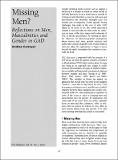| dc.contributor.author | Cornwall, Andrea | en |
| dc.date.accessioned | 2016-02-01T14:45:50Z | |
| dc.date.available | 2016-02-01T14:45:50Z | |
| dc.date.issued | 01/04/2000 | en |
| dc.identifier.citation | Cornwall, A. (2000) Missing Men? . IDS Bulletin 31(2): 18-27 | en |
| dc.identifier.issn | 1759-5436 | en |
| dc.identifier.uri | https://opendocs.ids.ac.uk/opendocs/handle/20.500.12413/8808 | |
| dc.description.abstract | Summaries This article explores the implications of missing men for Gender and Development. Men, in all their diversity, are largely missing from representations of ‘gender issues’ and ‘gender relations’ in GAD. Mainstream development purveys its own set of stereotypical images of men, serving equally to miss the variety of men who occupy other, more marginal, positions in households and communities. Men remain residual and are often missing from institutionalised efforts to tackle gender inequity. Portrayed and engaged with only in relation to women, men are presumed to be powerful and are represented as problematic obstacles to equitable development. Men's experiences of powerlessness remain outside the frame of GAD, so threatening is the idea of the marginal man. Amidst widespread agreement that changing men, as well as women, is crucial if GAD is to make a difference, new strategies are needed. This article suggests that rather than simply ‘bringing men in’, the issues raised by reflecting on men, masculinities and gender in GAD require a more radical questioning of the analytical categories used in GAD, and a revised politics of engagement. | en |
| dc.format.extent | 10 | en |
| dc.publisher | Institute of Development Studies | en |
| dc.relation.ispartofseries | IDS Bulletin Vol. 31 Nos. 2 | en |
| dc.rights.uri | http://www.ids.ac.uk/files/dmfile/IDSOpenDocsStandardTermsOfUse.pdf | en |
| dc.title | Missing Men? | en |
| dc.type | Article | en |
| dc.rights.holder | © 2000 Institue of Development Studies | en |
| dc.identifier.doi | 10.1111/j.1759-5436.2000.mp31002003.x | en |

